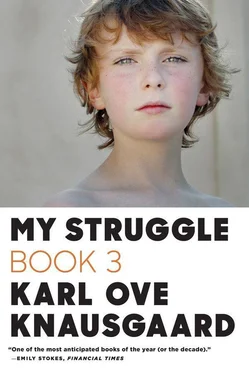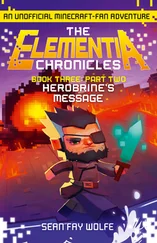Then he called.
The phone rang, Dad picked it up downstairs, perhaps three minutes went by before the handset upstairs clicked, which meant he had rung off. He came upstairs, his footsteps firm and laden with determination. On his way to see Mom. The voices from the kitchen were loud. I sat in bed crying. A few minutes later my bedroom door opened. Both of them came in. That never happened. Their faces were grave and somber.
“A man has just called me, Karl Ove,” Dad said. “He told me you dropped a big stone on his car and destroyed the roof. Is that true?”
“Yes,” I said.
“How could you do such a thing?” he said. “What’s wrong with you? You could have killed him! Don’t you understand? Don’t you understand how serious this is, Karl Ove?”
“Yes,” I said.
“If the stone had gone through the windshield,” Mom said, “he could have driven off the road or collided with another car. He could have died.”
“Yes,” I said.
“Now I have to pay for the repairs. Which will run into several thousand kroner. And that’s money we don’t have!” Dad said. “Where do you think that’s going to come from, eh?”
“I don’t know,” I said.
“Oh, you accursed boy!” he said, turning away.
“And then you didn’t say a word,” Mom said. “It’s more than a week since it happened. You have to tell us when this kind of thing happens. Do you understand? Promise me you will.”
“Yes,” I said. “But I told Fru Hjellen.”
“Fru Hjellen ?” Dad said. “And not us?”
“Yes.”
He looked at me with those cold, angry eyes of his.
“Why did you do it?” Mom said. “How could you even think of dropping stones on cars? You must have known it was dangerous?”
“We didn’t think we would hit anything,” I said.
“We?” Dad said. “Were there more of you?”
“Geir was with me,” I said. “But I dropped the stone that hit the car.”
“Looks like I’ll have to have a chat with Prestbakmo as well,” Dad said, glancing at Mom. Then he turned to me.
“You’re grounded today and for two more days. No pocket money for this week or the following one. Do you understand?”
“Yes.”
Then they went out.
It had all passed. This too. It had been the darkness between the act and the revelation, when everything appeared normal but wasn’t, which had been so terrible. When everything trembled behind the static facade of everyday normality. Once, about a year earlier, a similar situation had made me run away. Then it had been not a rock but a knife that had led to the misfortune. All the other children had been given scout knives, except me. I was too small and too irresponsible. But then one day, in an act that bore some resemblance to a ceremony, Dad presented me with a knife. They trusted me, he said. I hid my disappointment that it was a girl’s knife he had bought and that the scout in the picture on the sheath wore a skirt, not trousers, these were details you could not expect an adult to understand, and I allowed my pleasure at receiving the knife to predominate because now I could cut and carve and chop and throw with the others. All I needed to do was keep the sheath out of their sight. That day I carved a sword with Leif Tore. A long piece of wood I sharpened at the end like a bradawl and a short piece nailed on as a handle. Swords in hand, we roamed the estate. Finding two girls, each with a doll’s stroller, we snuck after them for a while before we launched an attack, imagining we were pirates and they were ships, and again and again we ran our swords through the leather hoods of the strollers. The girls shouted and screamed, we retreated, they said they would tell on us, we began to worry about what we had done, and kept a wary eye on them. First of all, they went home, then they came out, and started to walk toward Gustavsen’s house and ours. Terrified of the consequences, we decided to run away. We climbed the mountain, went into the forest at the top, and walked as far as we could, that is, to the cliff above Lake Tjenna. Neither Leif Tore nor I had been there before. It was a long way from home and I thought we could sleep there and leave the following morning. We sat on the edge looking over. The sun hung low in the sky behind us; the countryside that spread out around us was golden in the sunshine. We sat there for half an hour perhaps. Then Leif Tore wanted to go home. He was hungry, he said. I tried to persuade him, we had run away after all, we couldn’t go back, but he stuck to his guns, he didn’t want to sleep outdoors under any circumstances, so I went back with him. Dad was waiting for me in the garden when I arrived home. He grabbed my arm in an iron grip, dragged me to my room, and told me I was grounded. The knife was confiscated, even though that wasn’t what I had used but a sword. They didn’t understand the difference. Stabbing with a knife was unthinkable. The sword was made of wood, it was what we had used for the attack, and they should have confiscated that. But they took the knife. I heard them talking about it. “Look,” Dad had said. “Look at the sheath. It’s completely ruined.” He was referring to all the holes I had made to hide the fact that the scout was wearing a skirt and not trousers, but he interpreted it as a sign that I was careless and immature. Sitting there in my room, grounded for that night and the following one, I watched Leif Tore playing outside. He had been given a slap and that was that. Slaps didn’t bother him.
But it passed. Everything passed. The girls got new strollers, the motorist got a new roof, the grounding came to an end, pocket money was reinstated, the road outside the house was packed with children in the evening, and the forest below was always open, day and night, winter and spring. Anne Lisbet and Solveig didn’t come down to us, we always went up to them, and in that way we had two worlds: one outside our houses, where we joined the gatherings of kids every evening, kicking a soccer ball, playing in the road, building dens in the forest below, running round and poking our noses in every nook and cranny of the estate, and when the cold came and the water froze, skating on Tjenna, with the wonderful sound of steel blades on ice, resounding against the low hills bordering the lake, and every day was filled with such intense pleasure — and another world up there with them, where everything appeared to resemble what we had at home because here too children were throwing themselves into everything you could throw yourself into, here too they kicked a soccer ball in the road, played games in the dark, here too they skipped, here too they skated when the water froze and skied when snow fell, yet it was different. The pleasure was somehow elsewhere, not in what we did but in who we did it with. So intense was the pleasure that it was often there even when they weren’t. One evening we played table tennis in Dag Lothar’s garage, one evening we snuck around a couple of workmen’s sheds by a new road in the forest, one evening we sat in Geir’s bedroom playing Chinese checkers, one evening I would be getting undressed by my bed and the thought of Anne Lisbet and her whole being could suddenly strike me with such force that I was left reeling with happiness and longing. Furthermore, it was not just her in those feelings, there was also her beautiful mother and her broad-shouldered father, who was a diver and had a couple of yellow oxygen bottles in the cellar bathroom, her little sister and brother, all the rooms in their house, and the pleasant fragrance that filled them. There were all the things she had in her room, so different from those that occupied mine, lots of dolls, dolls’ clothes, a lot of pink and frills. And there was what we did together, which her joy and enthusiasm heightened and added gloss to. Especially at school, where we kept to ourselves until a particular situation brought us together, it might be in a circle when we played Ta den ring og la den vandre and it was me she gave the ring to, or when it was me she caught while singing the last line of “ Bro bro brille ” and clasped her arms around or when I chased her in tag and she deliberately slowed down so that I could catch her. Oh, had it been up to me I could have run after Anne Lisbet all my life as long as I was allowed to wrap my arms around her at the end.
Читать дальше












